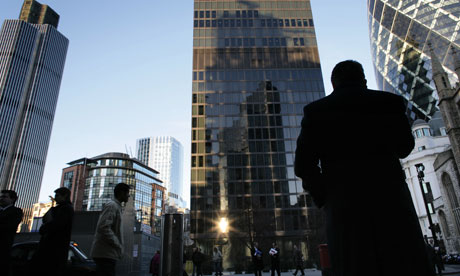Banks are the biggest scroungers of public money – solutions will not simply materialise if we don't keep up the pressure

Bank-bashing is in its third year and has become even more vociferous. Photograph: Martin Godwin
I have a confession to make: I wanted to be a banker once. While
arming myself with a degree in economics, I dreamed of working at an
investment bank arranging mergers and acquisitions. The growing size of
M&A activity got us budding economists excited and I wanted a part
of the action. But the dotcom boom of the late 90s lured me in instead
and I missed out on the opportunity to ruin the world's economy. In a
sign of the times, when I asked a university mate recently where he
worked now, he replied: "Goldm- *cough* -acks" rather haphazardly. It
seems not many want to be associated with the "great vampire squid" any more.
Banker bashing has now entered its third year and become even more vociferous, spreading to bonus bashing thanks to Network Rail. Last week columnists at the Times and Financial Times wailed that all this a) was hurting UK's economic prospects and b) would have limited traction with the public. The second excuse is easy to dismiss: actually there is plenty of public appetite for banker bashing to continue. They want more and they don't think it damages our economic prospects. But is it right to continue this, ask critics? Who will think of the [privately educated] children? Let me offer several reasons to continue banker bashing.
First, banking reform has been pitifully weak. If the crash were to happen again tomorrow, the government would have to bail them out again. They remain leveraged up to their eyeballs; remain "too big to fail" and too inter-connected to each other so most can't be allowed to go bust. Without public anger there is no impetus to push banking reforms further, which the Conservatives are stridently resisting and Labour is still reluctant to push too far.
Secondly, the banker bashing begs a wider question – if finance has become the life-blood of modern economies, why can't we exercise more control over such a vital industry? Consider this: we pretend that banks are private businesses that should be allowed to run their own affairs. But they are the biggest scroungers of public money of our time. Banks are lent vast sums of money by central banks at near-zero interest. They lend that money to us or back to the government at higher rates and rake in the difference by the billion. They don't even have to make clever investments to make huge profits.
At the height of the crash, US banks were simply given $13bn overnight. No repayment needed. We don't know what happened, because the details are kept secret. The entire industry is underwritten by guarantees from central banks. If threatened with systematic failure, which is becoming increasingly common, governments have no option but to bail them out. The financial system rules over our lives too, through our credit history. Everything could be choked off at a whim, through administrative error or for political reasons, and we wouldn't have democratic recourse. Organisations such as WikiLeaks were simply frozen out of the global financial system at the click of a button. Banks get special preferences like no other industry, and yet we don't even ask why these publicly subsidised yacht owners have so much control over our lives. Why not?
Far from being the pinnacle of free market capitalism, banking is full of sorry executives who keep asking for more handouts to protect their deliberately bloated businesses. The solutions won't materialise if we go back to how things were. Public anger has grown because it is starting to dawn on middle England that while the rest of us are paying for the crisis, the people who caused the crash want to go back to 2007. Even the Daily Mail is starting to reflect this impatience. This recession is already longer than the 1930s and the stagnation will continue for maybe a decade. For from being over, the nightmare for the Goodwins and Hesters is just getting started. And quite rightly too.
Banker bashing has now entered its third year and become even more vociferous, spreading to bonus bashing thanks to Network Rail. Last week columnists at the Times and Financial Times wailed that all this a) was hurting UK's economic prospects and b) would have limited traction with the public. The second excuse is easy to dismiss: actually there is plenty of public appetite for banker bashing to continue. They want more and they don't think it damages our economic prospects. But is it right to continue this, ask critics? Who will think of the [privately educated] children? Let me offer several reasons to continue banker bashing.
First, banking reform has been pitifully weak. If the crash were to happen again tomorrow, the government would have to bail them out again. They remain leveraged up to their eyeballs; remain "too big to fail" and too inter-connected to each other so most can't be allowed to go bust. Without public anger there is no impetus to push banking reforms further, which the Conservatives are stridently resisting and Labour is still reluctant to push too far.
Secondly, the banker bashing begs a wider question – if finance has become the life-blood of modern economies, why can't we exercise more control over such a vital industry? Consider this: we pretend that banks are private businesses that should be allowed to run their own affairs. But they are the biggest scroungers of public money of our time. Banks are lent vast sums of money by central banks at near-zero interest. They lend that money to us or back to the government at higher rates and rake in the difference by the billion. They don't even have to make clever investments to make huge profits.
At the height of the crash, US banks were simply given $13bn overnight. No repayment needed. We don't know what happened, because the details are kept secret. The entire industry is underwritten by guarantees from central banks. If threatened with systematic failure, which is becoming increasingly common, governments have no option but to bail them out. The financial system rules over our lives too, through our credit history. Everything could be choked off at a whim, through administrative error or for political reasons, and we wouldn't have democratic recourse. Organisations such as WikiLeaks were simply frozen out of the global financial system at the click of a button. Banks get special preferences like no other industry, and yet we don't even ask why these publicly subsidised yacht owners have so much control over our lives. Why not?
Far from being the pinnacle of free market capitalism, banking is full of sorry executives who keep asking for more handouts to protect their deliberately bloated businesses. The solutions won't materialise if we go back to how things were. Public anger has grown because it is starting to dawn on middle England that while the rest of us are paying for the crisis, the people who caused the crash want to go back to 2007. Even the Daily Mail is starting to reflect this impatience. This recession is already longer than the 1930s and the stagnation will continue for maybe a decade. For from being over, the nightmare for the Goodwins and Hesters is just getting started. And quite rightly too.

No comments:
Post a Comment